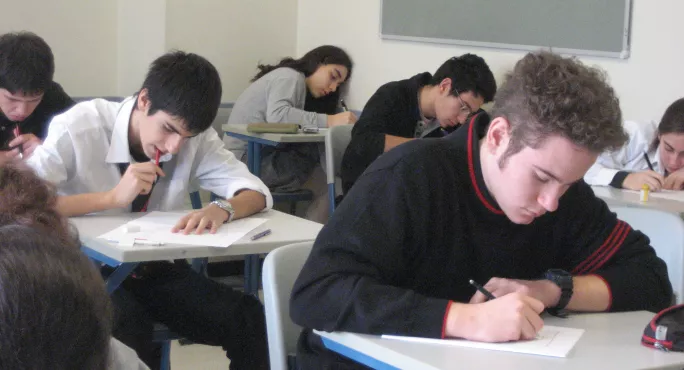Pupils are facing a significant increase in formal testing throughout their time at secondary school, it has emerged, as a leading academic warns of the “dangerous” unreliability of such assessment.
According to the Association of School and College Leaders (ASCL), the government’s GCSE and A-level reforms have sparked a “big shift” towards the use of more internal formal exams for all year groups in secondaries. Under the qualfication reforms, coursework has been reduced or removed and greater emphasis is placed on exams.
Cherry Ridgway, curriculum and assessment specialist at the ASCL, said: “A few years ago, there wouldn’t be many schools where children did formal exams in the hall in every subject in every year. Schools are moving towards that, and that’s quite a big shift.
Benfield School in Newcastle introduced formal end-of-year tests in core subjects for all pupils last summer. “We started doing it to prepare students for linear exams,” headteacher Neil Walker said. “It’s to help them develop the study skills required.”
Ms Ridgway said that some school leaders planned to make greater use of pupils’ test results to decide on ability sets in core subjects, believing this to be “logical” because of the fresh emphasis on exams in the reformed GCSEs.
But Professor Wiliam said that even if a school used a reliable test to place children in sets for maths, only 50 per cent of those children would be in the “right set”.
“That’s just a logical consequence of the less-than-perfect -reliability and the less-than-perfect validity of assessments,” he said. “That’s why it’s very dangerous to depend on a single measure.”
Professor Wiliam, of the UCL Institute of Education in London, cautioned against reliance on test results, saying that errors of measurement were “quite substantial” in GCSE papers.
He added that the validity of a test could be limited by a range of factors, such as if a maths test were worded in a way that required a high level of literacy to be understood, so it effectively tested students’ literacy rather than their mathematical ability.
To read the full story, get the 3 July edition of TES on your tablet or phone, or by downloading the TES Reader app for Android or iOS. Or pick it up at all good newsagents




